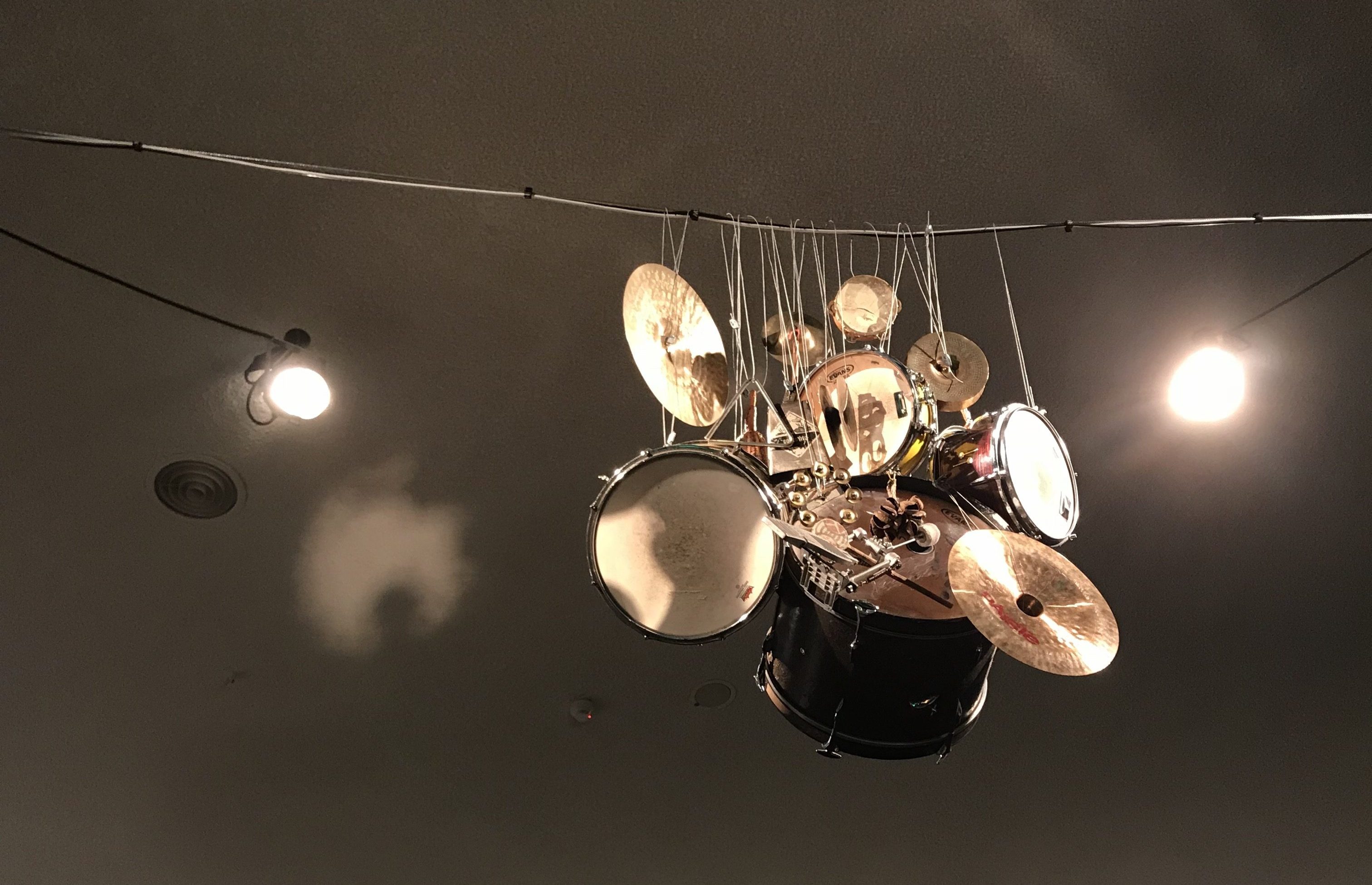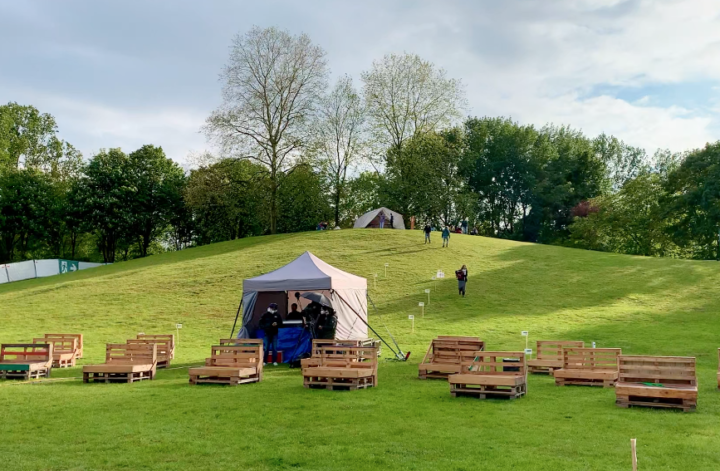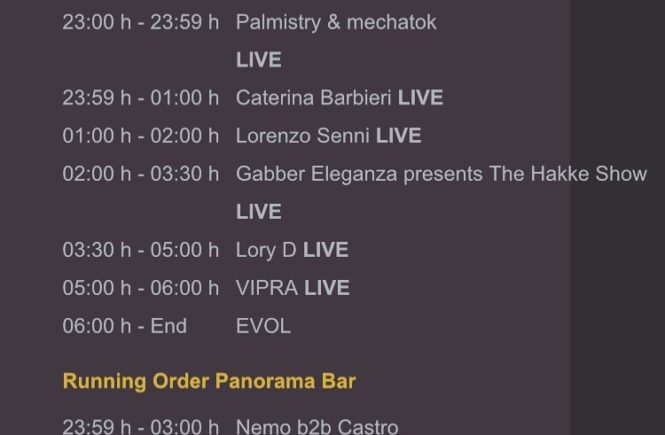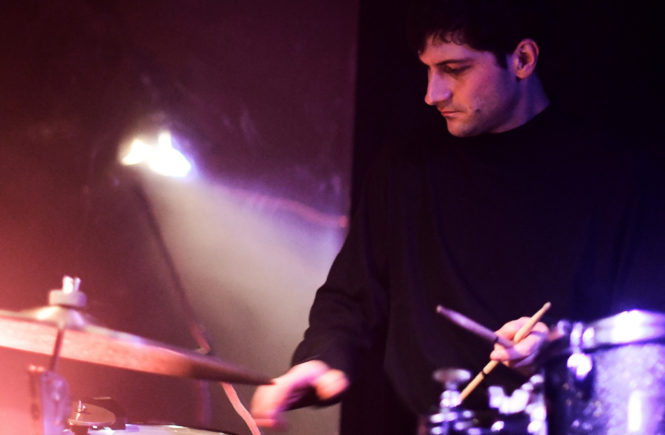This article is intended to offer a ‘How to’ guide for devotees in music and festivals, everyone including organizers, artists, and audience, on how to survive a pandemic. An interview was conducted to hear from some notable players in the scene surrounding a notable German music festival, the newly appointed CEO of the Moers Festival Jeanne-Marie Varain, and Matt Mottel of Talibam! who played a key role in this year’s festival.
I visited the Moers Festival’s 50th anniversary edition in May 2021 who made the brave decision to host live music with an audience, already in January, amid the height of pessimism towards an extended lockdown, when various scenarios were speculated on the strict limitations that may be in place.
Economically it made no sense and back then most concert dates were postponed as far up to 2022. Of course, some organizers are backed by plentiful funding from the government and local municipality, in a fortunate occurrence that they must not solely rely on ticket sales revenue, and so is the case with Moers. No doubt that financial issues play a large role on whether festivals can continue or not, so the first lesson would be, ‘fund culture’ and participate in activism and politics for what you believe in.
Besides the economical aspect, it can be said that Moers was a success story during of the early days of re-openings, considering that up to 500 people attended with zero confirmed cases throughout the 4 days of programs, and the team has started working towards the coming year’s production.
To luck or to doom, while piecing together this article I had by chance stumbled into another festival that was also celebrating their half centennial, which unfortunately lead to my contraction of the virus in question. Similarly inspired by the original Woodstock in the late 60s, this festival shares aspects with Moers like the aspiration for freedom and the multiple nights of improvised music. Contrary to Moers Festival or any other organized events these days, there were zero Covid restrictions in play at this gathering of nearly 500 free spirited flower children.
Instead are prohibitions on alcohol and hard drugs, electronics, shoes in the sacred fire circle, tents and camping chairs, soap or any other chemicals that could pollute the native habitat of co-residing plants and animals. (Hand washing is a must these days, and here we used ash and vinegar for disinfection.)
Based on the limited information I could gather and a small headline in the local tabloid, the majority of the gathering suffered contraction as a consequence of the momentary bliss of living in harmony with nature and with fellow brothers and sisters that lived like a family, unmasked (imagine nudists committing to wearing masks?) and unvaccinated (later I realize that many of these people were vaccine skeptics, and my status of being vaccinated just contributed to promote their view that vaccines were inefficient).
It was most stressful to find a consensus with the naturalists and anarchists, on how to proceed with the fact that we were all infected. I will refer to this festival as the Utopian Gathering, and any places or persons mentioned regarding this event will be based on fiction as I do not wish to put under scrutiny any real-life people or organizations. Rather this is about the lesson learned this strange summer, hopefully to fuel more conversations and ideas on how to stay sound, how we can keep the flame burning in times of adversity.
Moers Festival celebrated its 50th anniversary this year in 2021. That’s 50 full programs of music, 50 squads of collaboration and friendship, 50 attempts and experiments each time attempting to break free from the restraints of the past. Like wriggling flippers squirming to escape the fisherman’s hands, Moers Festival has resisted itself from the grasps of definitions. Definitions like ‘Jazz Festival’, or genres like ‘Free Jazz’ and ‘New Music’ or any such characterization have been eschewed and shredded. In order to be free, for maximum artistic leeway, only few words remain sanctioned, like ‘Free Festival’ ‘Free Music’ and ‘Free Improvisation’, serving the purpose for those who still wish to portray the traditional annual gathering in one way or the other.
‘Free Music Festival’ is quite fitting, because for the past years many of the festivals’ programs have been open to the public for free, in an attempt to connect curious town inhabitants to the unique sonority of the festival with a low entry hurdle. The free concerts were held as sessions, an unofficial program which also aims to connect the various artists on the bill. The formation of these ‘Moers Sessions’ are announced one day before, combining members from different bands and acts, to play a completely improvised set in outdoor settings or at one of the town’s local venues.
The festival Dorf (village in German) was also a place to be for the inquisitive local onlookers. Just outside of the festival hall, food trucks and espresso vans created a chipper market, offering delicacies and plenty of benches to rest, while a small stage offered performances by international artists no less exciting than the acts on bill in the main hall. My Airbnb host in Moers shares with me, how the family looked forward to visiting the festival Dorf each year. Although they never bought tickets to attend the festival officially, enjoying the various festival street cuisines and listening to the free concerts had become part of their Pfingsten weekend tradition as residents in Moers.

Unfortunately, amid the pandemic, the free concerts and street food offerings could not take place this year. Instead the time table was split between two venues, one indoor stage in the limited personnel access festival hall which was live-streamed worldwide by ARTE, and a grassy hill overlooking a podium in the Schloss Park Moers with limited audience, both sites requiring daily testing for every single participant.

grand ensemble is performing a Julius Eastman piece
After the humdrum socially distanced winter plodded slowly past, by this time the concept of live-streamed concerts hardened to the lifestyle of a music fan, witnessing a concert with actual people around was doubtlessly moving.
I think I saw the same local old-time buddies that I’d met in 2018, where we shared a conversation over a cup of espresso, who’d told me they’d been visiting the festival for more than 20 years. My German back then was barely usable and that was much of the entire conversation, but another memorable topic was that the right side of the Rhein in that region is actually left (winged) and that they were happy to be on the ‘right’ side. We shared some smokes together and moved on to wine and then went into the hall to enjoy some more concerts. This year I noticed them from a distance atop the hill, laid back and versed swaying together to the music, but with no espresso van between us, and also no alcohol to give me the courage to ask them if they’d remembered that little conversation from 3 years ago, the social distance was felt.

Two months after the strictly controlled 2021 festival ended with a maximum of 500 people in the openair stage and zero confirmed infections, I am sitting with the Festival’s new managing director Jeanne-Marie Varain and key-tar player Matt Mottel (who is committed to the 2021 festival year round as the Improvisor in Residence), over Zoom, eager to hear about the team’s efforts and challenges to open the festival once again to the public.
My dearest respect goes to this young new CEO of the festival, as she was the person responsible for giving this music fan turned writer one of the biggest reasons to fall in love with the German experimental scene, as the organizer of the LEGENDARY Avantgarde Festival in Schiphorst. It was to my biggest delight to find out that she was now part of the Moers Festival organism, as this Avant-fiesta that took place from 1996 to 2017 resembled in many ways the freedom and spirit that Moers embodies.
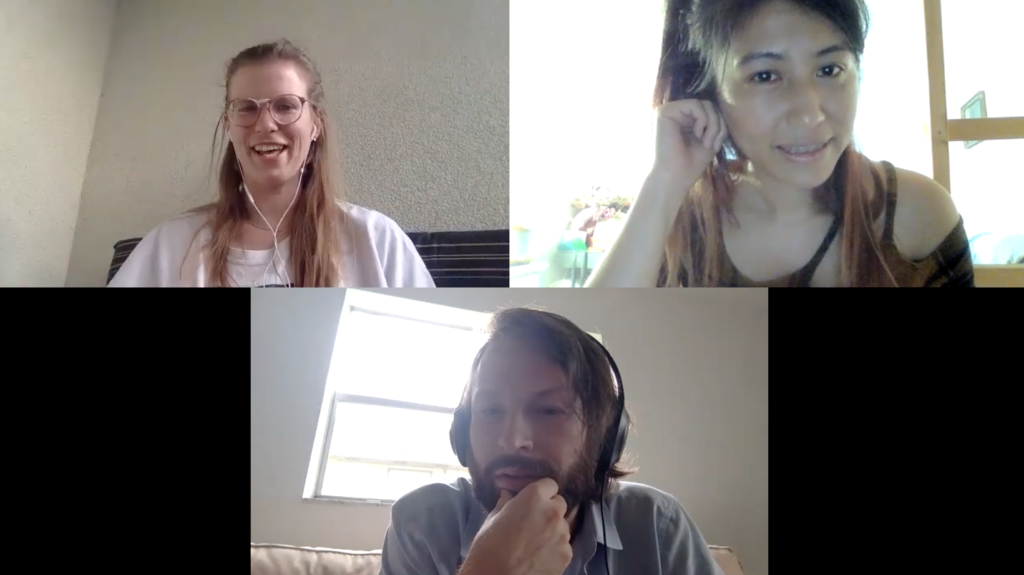
This small festival took place in a much more intimate setting, namely a barn house in a tiny village 2 hours by train and bus from Hamburg, but the same freedom and intimacy was present.
Taigen Kawabe from BoNingen who played in 2013 shares with me, “I remember it was quite far to reach. A fire truck came to entertain the kids, and people would watch the show with balloons in their hands. Everything was handmade and had a village festival feeling to it, which is quite special and I remember it fondly. We played with Damo Suzuki and Faust.”
Jeanne-Marie recalls the first editions of the Avantgarde Festivals she experienced as a child in the 90s in a similar way, which was then organized by her father Jean-Hervé Péron of Faust. “It was more like presentations of sports by the local kids. They would do a football match, Aikido, and there were dancers and music, and artist performances. It was magical for me, because there was no expectation of what a festival should be.”
She goes on to tell me of a memorable year when there was a mix-up of locations and people who anticipated to attend a techno-pop-Schlager party (Schlager is the much abhorred genre of mass pop music in Germany) came to the Avantgarde Festival instead, completely confused, super pumped and ready to party, stumbling into a performance of an artist sleeping with a sheep and what not. “And people loved it! It was the best thing that happened and the big talk for the next 10 years.”
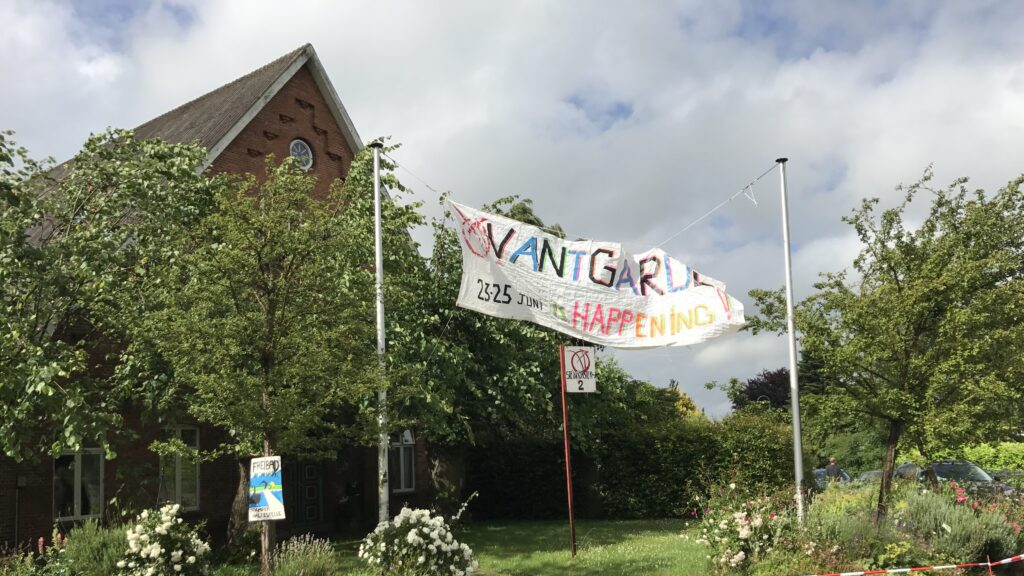
Among the most memorable things about this Happening for me when I attended in 2017, was the low bar between the audience and performers – which were say half the people present. Jeanne-Marie explains that an important principle of the Avantgarde Festival was to have ‘No backstage’ which allowed everyone to eat together, share sleeping quarters, and spurred participation.
The approach of Josef Beuys’ Soziale-Plastik (social sculpture) is brought up to explain the ideals of this barn fest. The notion, that every person of society is a participant in the creation of art in its totality…, things like taste, smell, sensory perceptions and all people and environment is facilitated in the production, or without particular direction and just ‘let be’, she explains.
This principle of inclusivity and Total Art was visible in the kitchen where we were all served beautiful freshly prepared food by the volunteers, the lush green garden with roses that turned into a camping ground or a sleeping stage where participants without a tent could rest the night while a meditative performance lulled them to sleep, the neighbor’s house which served as a satellite stage, or programs like a chess tournament (a tradition of the festival because there happened to be a chess champion and he could play against 20 challengers at once).
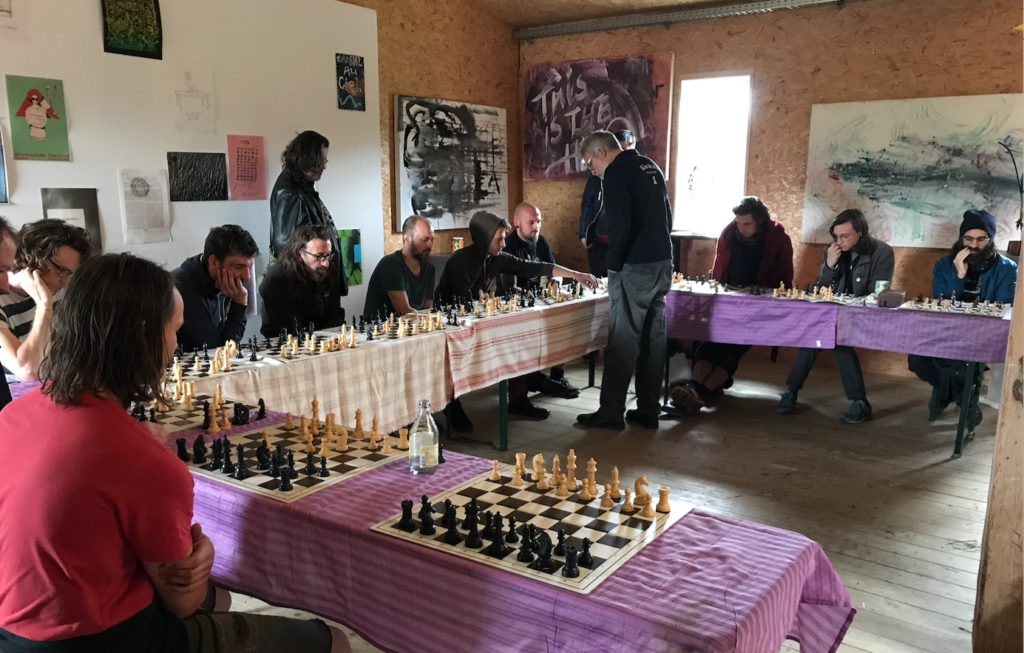
And also notable was the existence of an ‘Annex stage’ which was an open mic session stage broadcast via internet radio by an ambitious group of students, producing some of the most free flowing beautiful jazz, psychedelic, and nonconformist jams.
The stage was basically a large living room, and whenever you stumbled in, sofas would be moved around in a different formation, to the comfort of listening to (or participating in) the formation which was at that time humming tunes. Here I witness the drummer of jazz rock group Giardini creaming the notes on a sax, or the trumpet player (well to be exact a cornet player) from the Swedish psychedelic rock band Octopus Ride lying on her back with mic in hand, while she ecstatically engages with the carpet and other random furniture and improvisers, at one point she succeeds in tempting a shy friend to sing along with her. Those casual moments are still alive in my music memory.
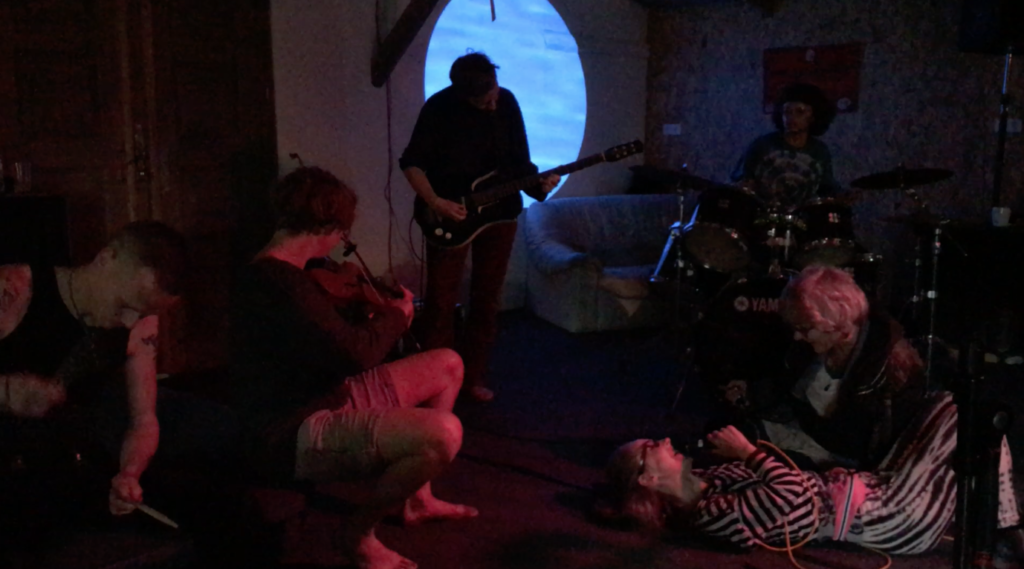
“Gig bookings and meeting and playing with people there, are supposed to be a casual thing” Matt begins, tackling the outré live gig formats of the new normal. “The things I hated most when going to clubs when I was younger, was when the door people were being super strict, about smoking in the que, or all the rules that made it not a cool place to be.” Immediately off-putting are those moments when a big bossy security makes it known that there are rules and that we are not part of constituting them.
Security was present at Moers both from the festival side and the city, watching keenly and warning people when they left their masks off too long to slowly sip at their coffee or non-alcoholic beers. Arms crossed and uniformed boots rooted to the ground, the officers watched over the festival grounds from atop the hill.
At some point Jeanne-Marie could not help but to go over to them and plead not to look so awful and threatening, and so they kindly did, or at least tried.

Another restriction that made the gig attendance less casual, was the limited access for concerts in the indoor hall. “The comradery is just not there” sighs Matt, when not being able to see his colleagues’ performances. Backstage and press passes were non-existent, and every musician, press, volunteer had to que for the limited seats to witness the gigs held inside closed doors. Some of the concerts that we missed in on, we would watch on the screen just like the rest of the world, although Brad Mehldau is live on the concert grand just 50 meters away. (But in front of that monitor screen is where I first met sweet Marja Burchard from Embryo, and our unfortunate fates birthed sympathy towards each other…)
Among all the things we missed, and felt incomplete, and loathed the new normal, was something I did not really realize until Matt brings up his recollection of one particular espresso truck. This is the same truck where I met those local old timer Moers friends, and probably where I first chatted up Matt, and how Matt describes as the ‘super key hang’ where you can pay 2 euros and ‘bang you’re caffeinated!!’.
It’s funny how such a simple thing as a van serving espressos can be the essence of an experience. It is invisible until the moment it is missed, but not for Jeanne-Marie, as she understands the totality of a festival and arts. “I love that you mentioned the espresso machine or truck because when I wrote my master’s thesis, which was about ‘Art as a companion of transformative processes of society’, I introduced a tool, which is my coffee machine for breaking boundaries, bringing people together. Because it’s such a low-key offer, in all cultures, and all ages, you know exactly what to do there. You go there, and you order a coffee. And it’s super cheap. And it’s such a low approach to get to talk to people, you know, it’s something really connecting. It’s this small machine, which makes it able to just meet people. Since mostly coffee takes a while to do but not too long, that’s the moment where you can pop some questions to the person who makes the coffee. And especially when you say that’s a person that comes to the festival already for a few decades, like at the Moers Festival!”
The comradery and espresso moments, the feeling of casual participation, is sadly missed, as the void unmasked the significance and role of these accompanying aspects. But the show must go on. Not only for the “people who will lose their jobs, become depressed, but some will even trade professions and stop working in the field of culture” emphasizes Jeanne-Marie. If that is the new normal, how devastating.
One important effort that the team held at the top of their agenda, was to keep the show going especially for the participants whose livelihoods are intertwined with the production. And so the 2020 edition of the festival was carried out fully streamed with no public attendance, but with lots of technical people involved.

This year the team made it their agenda, to slowly but surely spread their webs back into the city and to be present in front of the public, which manifested as the invasion of the festival back into the Schloss Park of Moers. “It’s also a political fight, that Tim (Isofort, director of Moers Festival since 2017) has been fighting for, by applying and applying,” she explains.
Spreading like an organism, or a ‘virus’, into the town (which is not necessarily the best association in these times, lol), Matt applies a metaphor from the performance artist and sculptor Vito Acconci who purposed his public art as a virus to the society. The virus is an invader and foreign entity, that ‘makes people question their surroundings instead of walking right through it’. Moers Festival carried out a campaign for their 50th anniversary to make an interactive installation throughout the city, which was in a way to take over the town like a virus.
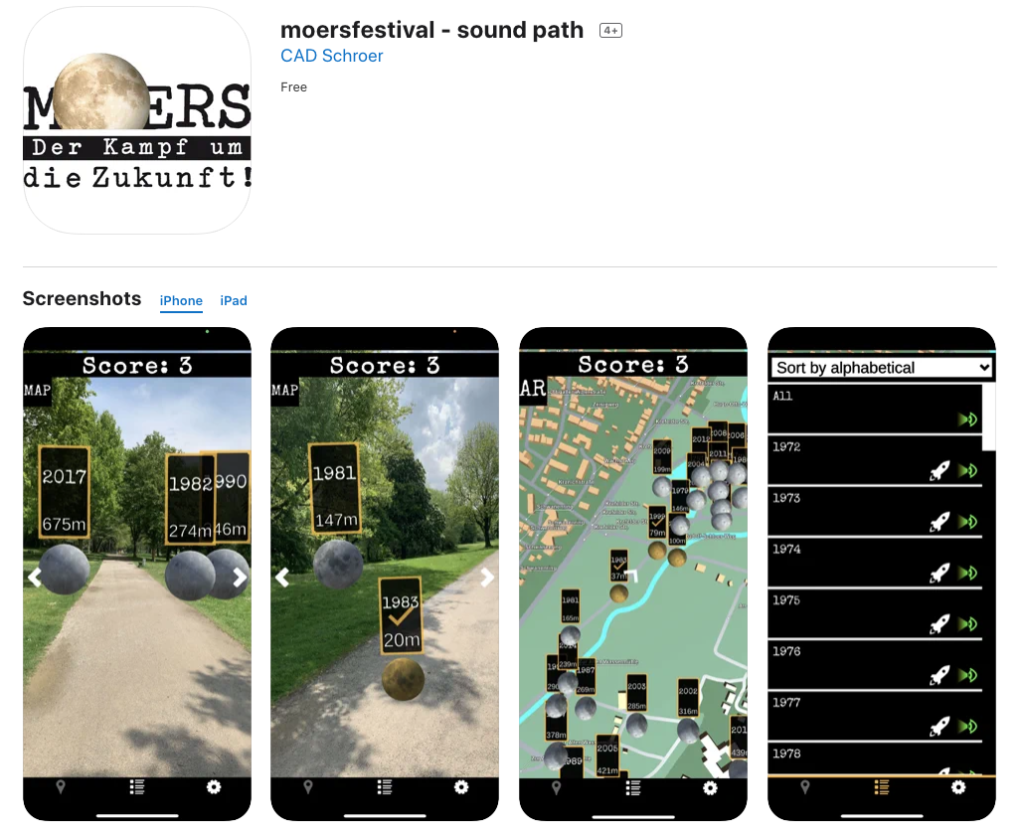
“I totally agree,” Jeanne-Marie chimes in, “it’s really good to destabilize people. So that they are confused, or feel uncomfortable. All these phrases which have a negative touch to it, but it’s important because this virus idea sharpens your senses once you feel that something is not in order anymore, because then you have to be aware and cautious of what’s your next step? This is also the mentality of my father, where he would hang 1000s of strings from the ceiling in the venue just so that the people get annoyed by this, or a hay blaster pumping fresh hay into the venue or like an intense haze so that nobody could see anymore and it smells weird and you feel sick. But it’s not to make a spectacle it’s a way to shake people and wake them up. To destabilize a situation to make people more conscious in the moment because everybody is so used to getting entertained and that has to stop. Everybody has to take part in it and these destabilizing situations are the best way you can do it and that’s doing the unpredictable.”
Destabilizing and proceeding with the unexpected, free from expectations and the weight of history, is especially important in a festival with a longstanding history like Moers. There is already a public expectation of what Moers Festival is, or should be, which Jeanne-Marie together with artistic director Tim Isfort are trying to break free from.
“I think the 50th anniversary was an occasion to understand the history of the festival fully, we dug really deep into the archives and I think we know now pretty much everything we can know about the last 50 editions of the festival and we tried to reach all the expectations we could within the corona virus situation. But now we feel like we have we stepped through a door and now have a wide empty page in front of us.” How exciting to look forward to the coming editions of Moers, that will now evolve with the spirit of the former curious little child who drank the ‘magic potion’ of the Avant Garde Festival!
This conversation with Jeanne-Marie and Matt was an enlightening moment, adding a further meaning to virality and what the new normal could be. A virus has shaken us and we are made aware of our surroundings, and we are thinking, what is the next step? What matters? Truth is uncovered about our total senses and how precious it is to be socially connected.
“Trust your gut and stay safer than the rules require” is one advice from Jeanne-Marie, who recently got Covid at a gig despite the small attendance and testing. Infections can happen anywhere, but the meaning is somewhat different depending on context.
Here, I weigh my experiences at the heavily controlled Moers Festival and the un-controlled Utopian Gathering where I contracted an infection. At Moers, it was stressful to be told to wear masks all the time, and wait 20 minutes to get test results from a swab each day.

But this inconvenience is incomparable to the fear, guilt and shame I felt after realizing I was infected while attending a festival where there were no precautions taken besides regular reminders to wash hands with ash and vinegar. Hugs and kisses, eating together the same meal in a large circle, the notion that everyone is family there is indeed beautiful and I loved it. I had forgotten my initial gut feeling that said ‘not a good idea’ to participating under the given conditions.
How awful it felt, to be a part of a problem, that could have been well anticipated, and that my actions could harm the unaware locals. What if there were testing policies in place before entering the so-called utopia? At least then, there wouldn’t be this daunting regret I felt later, and could forgive myself for weighing in on the hypocrisy of a utopia.
‘It’s just a bad flu’ chirped one enchanted habitant of this boho lifestyle, and that ‘nature heals’, and many people there are young healthy individuals who can hike the 3-hour trail to the secluded location.
This argument disregards inclusivity of frailer individuals, to the local town that the festival relies on for supplies and support, to children who are there not by their own will, and exposes the escapism and individualism of this selfish kind of yearn for freedom. Instead, the kind of freedom that we should be striving for, are the ones that enhance inclusivity and accessibility, something provocative of the mind, the idea of a virus and not the virus itself. Testing, vaccines, and precautions that will lower the hurdle for participation for everyone in the society, is what freedom looks like for me.
So, what does it take for culture, music, a festival to be resilient in the time of crisis? Take risks, get infected by a virus, but not in the literal sense!
